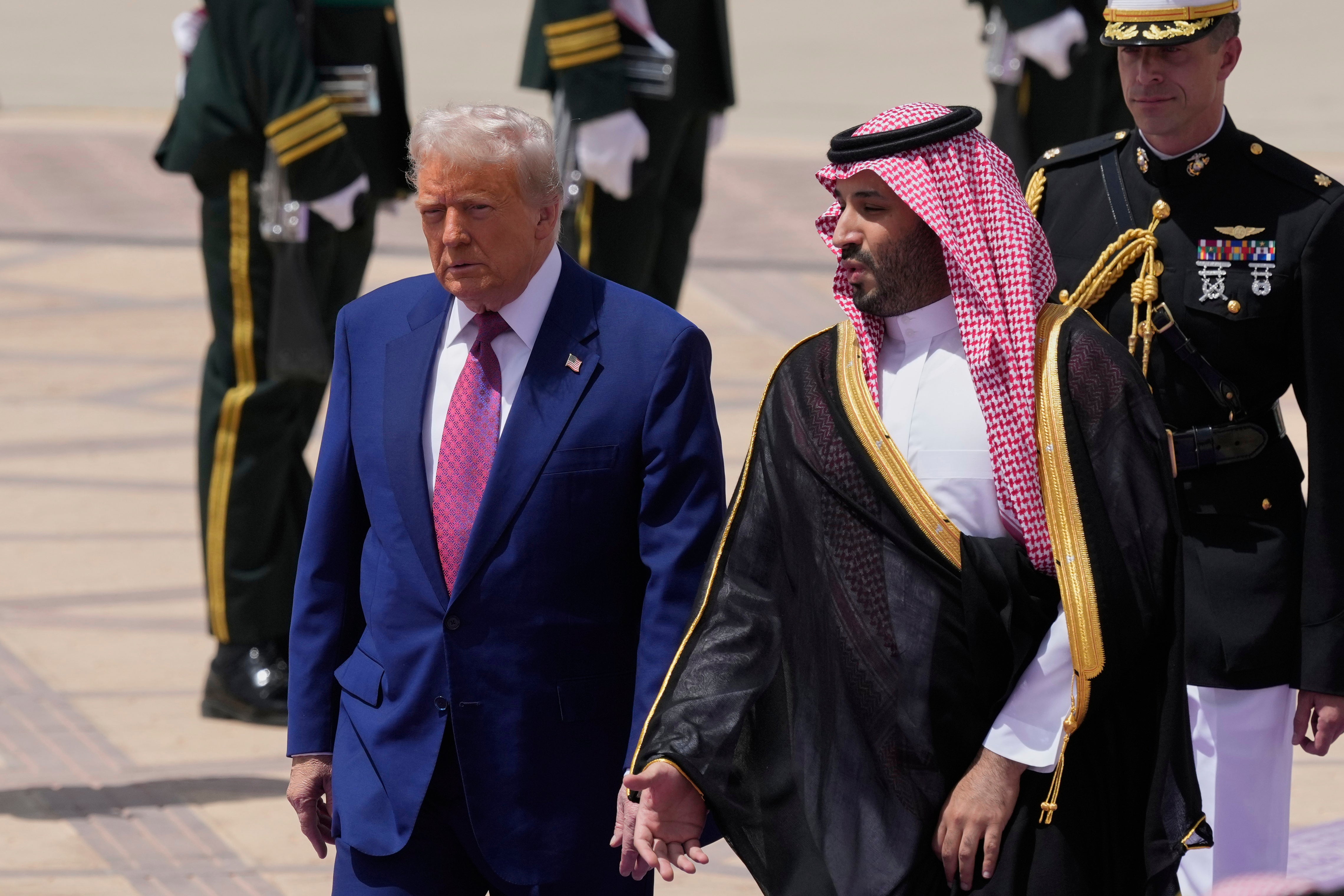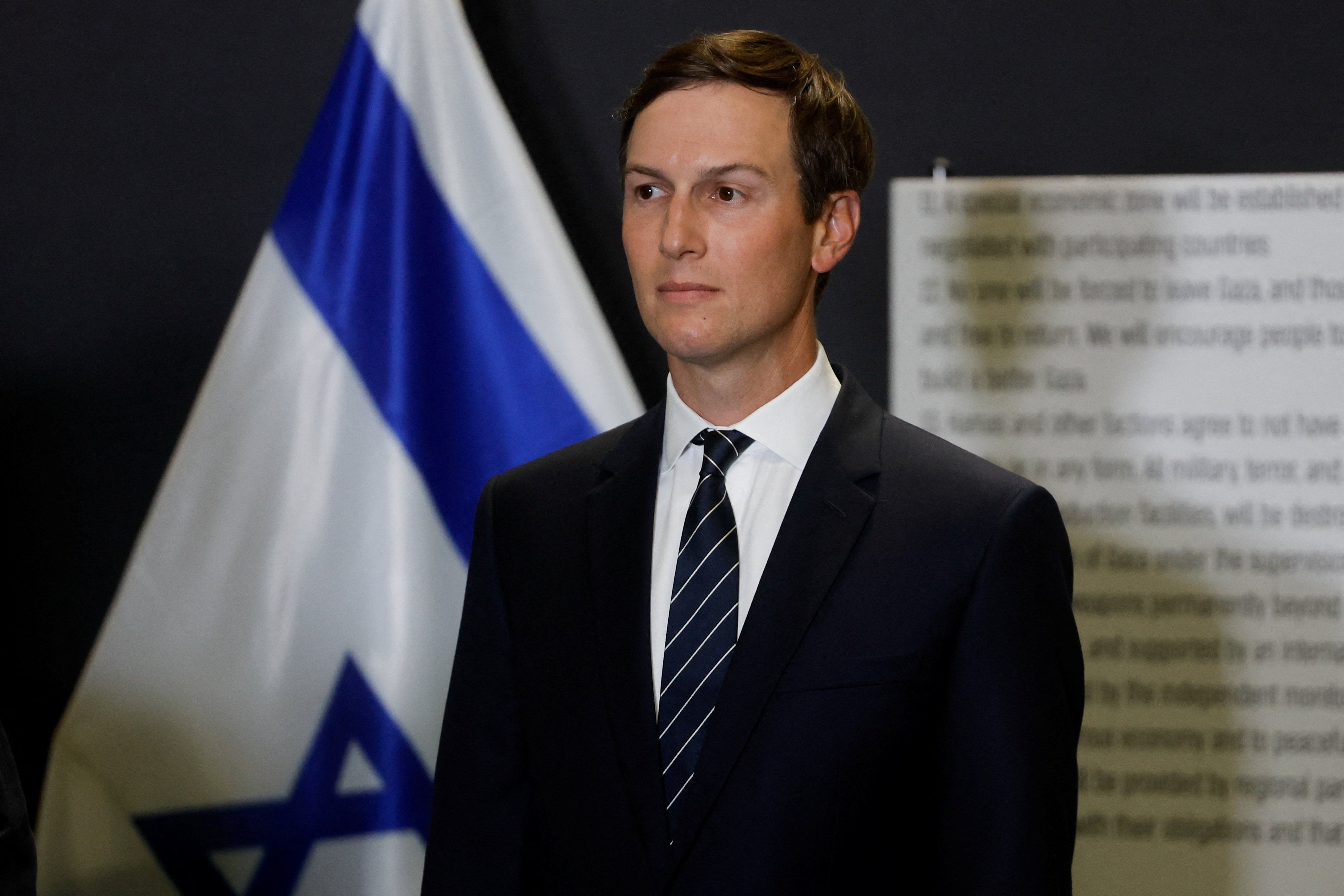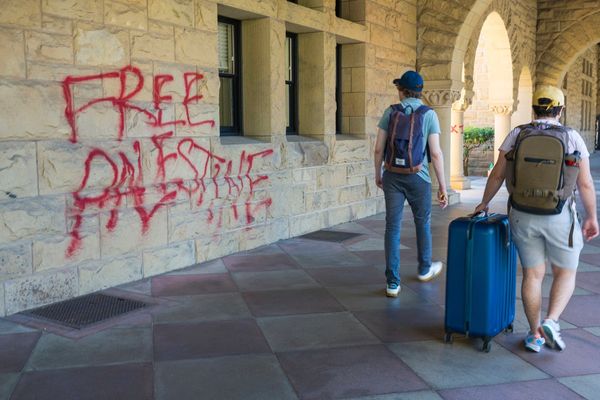At a lavish black-tie dinner in the East Room on Tuesday to honor Saudi Crown Prince Mohammed bin Salman, President Donald Trump described himself as the “best friend” the future king and his future kingdom “ever had.”
Less than 24 hours later, at a Saudi-U.S. investment forum at the Kennedy Center, the president said the “partnership” between Washington and Riyadh is “among the most consequential in the world” and boasted that he and Mohammed were “making our alliance stronger and more powerful than it’s ever been before.”
Trump then took the opportunity to bash his two most recent predecessors at the public event by decrying how two former presidents, Barack Obama and Joe Biden, had “not good” relationships with the oil-rich and repressive — but strategically important — absolute monarchy led by the crown prince’s father, King Salman bin Abdulaziz Al Saud.
“You didn't have a good relationship with Barack Hussein Obama. You didn't have a good relationship with sleepy Joe Biden, but you had a great relationship with me, and now it's as good as it was, and probably even better, if you think about it, because we took the Dark Cloud away from your country,” Trump said.
To be fair — and accurate — the “dark cloud” to which Trump was referring was the specter of Iran’s nuclear program, which the president claims to have “obliterated” in a series of airstrikes by B-2 stealth bombers dropping bunker-busting munitions this past June.
But the 45th president’s return to office as the 47th American commander-in-chief let him lift a different cloud from the crown prince and his government — and strengthen a completely different alliance from the one he spoke of on Wednesday.
Ever since President Franklin Delano Roosevelt established relations with Abdulaziz Al Saud — the founder of Saudi Arabia — in 1945 as part of a push to secure access to petroleum for the United States and its allies, successors of both men have operated under a tacit agreement: The Saudis would ensure American access to cheap oil, and in exchange the U.S. would provide military support while looking the other way to the kingdom’s grotesque human rights record.
That alliance began to show cracks under Obama, who incensed Riyadh by pursuing an agreement to curtail Tehran’s nuclear program and by putting human rights and the rights of woman and religious minorities — two groups that have long lacked protections in the Saudi kingdom — high on his list of foreign policy priorities.
It frayed even further under Biden, who’d vowed to make MBS a “pariah” after U.S. intelligence officials concluded that he’d authorized the October 2018 murder of Washington Post columnist Jamal Kashoggi at the Saudi consulate in Istanbul (the Saudi government has denied the allegations).
But when Trump describes himself as the “best friend” a Saudi monarch — or his heir apparent — “ever had,” he’s right.
Upon his initial ascent to the presidency in 2017, and again after his improbable return to the White House a full eight years later, he chose Saudi Arabia as the first place outside the country to which he’d travel, both times eschewing the presidential tradition of making traditional U.S. allies Canada or Mexico the first foreign destination of a new chief executive’s term.
On each trip, the Saudi government feted him in a lavish, over-the-top style well-suited to Trump’s own monarchical pretensions, with King Salman and MBS giving the president of the world’s oldest constitutional republic receptions befitting of a fellow monarch.

In return, Trump has given the wealthy kingdom primacy over nearly all American allies, rewarding the Saudi government with a massive $110 billion arms package announced during his first term, including $15 billion in Terminal High Altitude Area Defense systems (to protect against ballistic missiles), another $8 billion in arms sales that bypassed Congress’ review process, and more.
Riyadh got even more out of Trump when he traveled there in May, including through a $142 billion defense cooperation agreement, plus a long-sought civil nuclear deal signed this past week in addition to the president’s designation of the kingdom as a “Major Non-NATO Ally,” a status that will give the Saudis preferential access to American weapons.
Moreover, Trump has effectively ended any effort to isolate or censure the Saudi government or MBS for what they did to Kashoggi, the slain journalist who was a U.S. permanent resident at the time of his death.
During an Oval Office meeting with MBS this week, Trump flew into a rage when a reporter asked the Crown Prince a question about the Post columnist’s murder, calling her “insubordinate” and “a terrible person” while maligning the slain and dismembered journalist as “extremely controversial” and someone who “a lot of people didn’t like,” essentially arguing that Kashoggi deserved what he got.
While the president has frequently claimed that the Saudis are returning the country’s generosity in weapons by investing as much as $1 trillion into the U.S. — an amount equal to the country’s entire GDP — what has played far more of a role in cementing the relationship between him and the House of Saud is an entirely different set of investments into Trump’s own family’s pockets.
Just this month, the Trump Organization has announced a series of billion-dollar developments in the Kingdom, constructed in partnership with a Saudi construction company called Dar Global.
There are plans for a Trump Tower in Jeddah, the Kingdom’s second-largest city, as well as another $1 billion project in the same city that will bear the name Trump Plaza, plus the Trump Organization is reportedly in talks to build a branded property as part of the Saudi Public Investment Fund’s $63 billion Diriyah Gate development.
Trump’s eponymous company is also raking in millions upon millions from the Saudi-backed LIV Golf league, which is financed by the Kingdom’s Public Investment Fund and competes with the American PGA Tour.
The same sovereign wealth fund also put a reported $2 billion into a private equity fund started by Trump’s son-in-law and occasional Middle East negotiator, Jared Kushner, shortly after the end of his first term — despite Kushner having no experience in private equity.

Is the point of all this to imply that the president is solely motivated by greed when making consequential foreign policy decisions? Not at all — the U.S. and the Saudis have had a close relationship since the end of World War II, with arms sales taking place even when tensions were high under Obama and Biden.
But Trump’s clear affection for MBS and the Crown Prince’s own affinity for the American president aren’t the result of that alliance.
They are what happens when an American president with autocratic tendencies who has long run his own international business empire meets a literal monarch-in-waiting and sees him as a kindred spirit.
For Trump, MBS and the government he now leads in every way that matters are a model for how he wishes the American government could be run — as a family enterprise concerned mostly with the accumulation of wealth and power in that family’s hands.
The president also views MBS as a “tough” and “strong” leader because he tolerates no dissent — and is willing to reach far across the world to silence it, even when that means authorizing the murder of a U.S. resident. For Trump, that’s not an atrocity, it’s just a hard man making a hard choice to do what has to be done.
The U.S.-Saudi relationship may be strategically important, and it may truly be “stronger than ever” under Trump. But in the 47th president’s mind, the relationship that matters isn’t between Washington and Riyadh — it’s between the Trumps and the al-Sauds.







